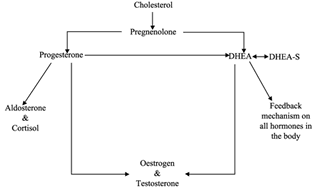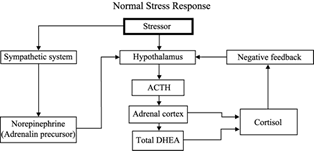 |
The youth and the health hormone
DHEA or dehydroepiandrosterone is another effective anti-aging hormone that
works in synergy with HGH and melatonin. It is regarded as " its promise
as an antidote to the diseases of aging and as a whole body rejuvenator"
by Dr. C. Norman Shealy. 38
DHEA is an essential building block for sex and other hormones such as oestrogen
and testosterone.
DHEA seems to be deficient in a number of degenerative diseases including diabetes,
atherosclerosis, hypertension, coronary heart disease, stroke, obesity, osteoporosis,
cancer, and some autoimmune diseases.
DHEA is made from cholesterol in the adrenal glands. Yet it is ironic that
with aging cholesterol rises whereas DHEA levels often fall. Initially pregnenolone
is manufactured from cholesterol; and from pregnenolone, progesterone and DHEA
are produced.
DHEA is found in the blood in two forms namely DHEA and DHEA Sulfate or DHEA-S.
DHEA-S acts as back up for DHEA. Most of DHEA in the blood is in the form of
DHEA-S.
Progesterone goes on to produce cotrisol, aldosterone, oestrogen and testosterone.
The following diagram is demonstrating the process of DHEA production from
cholesterol and pregnenolone.

Figure 4: As you can see from the chart, oestrogen and
testosterone are made both from progesterone and DHEA.
Aldosterone is important in the balance of electrolytes and minerals in the
body.
Cortisol is released by adrenals as a response to stress. Cortisol in normal
levels is vital for our daily functions. In times of stress our body needs energy
to cope with it, and hence corisol is released to provide glucose to the body
as the primary source of energy. If cortisol is constantly at a high level,
it affects our body in many ways. It stimulates the supply of sufficient amount
of glucose from all stores in the body. When the glucose stores are depleted
then it turns to your muscles to break down protein to produce energy. This
results in ongoing loss of muscle bulk and development of flabby muscles.
Stress, Cortisol and DHEA
As discussed in chapter one, stress is part of our daily life and is inevitable.
The question is what factors influence it, what effect it has on the body and
how we deal with it. The factors, which cause stress, could be divided into
four categories:
- Physical, such as lack of exercise, inadequate light toxins, allergens,
too hot or too cold environment and trauma.
- Emotional, such as fear, anger and resentment, worries, guilt, anxiety,
depression, pain and lack of sleep.
- Chemical, such as sugar, cigarette smoking, alcohol, excessive caffeine
due to coffee, pollution in air, water, and food, infection and nutritional
deficiency.
- Electromagnetic, such as cars, television, mobile phones, computers, computer
printers, refrigerators, airplanes and fluorescent lights. 38
The causes could also divide into Predictable and Unpredictable.
- Predictable: due to work or setting unrealistic goals.
- Work: If stress is excessive: Avoid the situation, change the situation,
cope with the situation by changing your behaviour
Unrealistic goals and expectations
Setting goals is good; goals give us direction, purpose to accomplish more,
but should be realistic, one step at a time and achievable.
Unpredictable
Losing your job
Natural disaster
Death of a loved one
Traumatic events
Financial
How does stress affect our body, and in particular cortisol and DHEA?
As noted in the previous chapters, stress generates many free radicals, which
in turn will cause oxidative stress, and the aftermath will be degenerative
diseases. Our body responds to acute stress by stimulating the sympathetic system,
which release norepinephrine, which in turn together with stress stimulates
hypothalamus to secrete ACTH to stimulate the adrenals in order to make cotrisol
and DHEA, as shown in the diagram below.

Figure 5: At this stage ACTH, cortisol and DHEA are evenly
raised.
Our body tries to stay in a state of balance, so called homeostasis. However,
as the stress becomes chronic the body goes through adaptation and exhaustion
stages. When the stress is chronic and at the stage of adaptation, there is
excessive secretion of ACTH and cortisol but DHEA levels are stable. Adaptation
brings along some ill effects including abnormal blood sugar, the beginning
of osteoporosis, an increase in body fat deposition, salt and water retention,
and lower immune system. At the exhaustion stage there are constant high levels
of cortisol, but on the other hand DHEA is decreased and insulin becomes erratic.
You go to bed and sleep but get up tired in the morning. Your immune system
is now quite weak, hence becoming prone to infections. You are in danger of
developing coronary heart disease, diabetes, stroke, cancer, and other degenerative
diseases.
|
 |
How do we deal with stress?
DHEA is the opposite of cortisol as it brings the body to peace and balance.
As discussed, DHEA is made from pregnenolone, which also promotes peace and
tranquillity.
Dealing with stress is a vast topic and it is beyond the scope of this book.
However, the following advice could be helpful.
One needs to try to tackle the actual root of stress, face it and deal with
it. The majority of things that stress us out are very trivial. You may have
noticed that after they have been resolved or a few months later, on thinking
back we realise how trivial they were. Every stressful situation has a solution.
It is only a matter of rational thinking and communication to resolve the issue
and remove the stress. One needs to look at the opportunity not the problem.
In other words look at the problems more as opportunities and challenges. One
also needs to have a balanced diet, to exercise regularly, sleep well, take
nutritional supplementation, engage in fun activities, laugh, use relaxation
techniques, and do not forget prayer and meditation.
What activities excite and motivate you?
What things would you do all day even if you didn't get paid to do them?
What gives you unlimited energy?
You need to find out what is right for you, and set up systems so you can spend
most of your time doing it.
Contentment is so vital in modifying stress and bringing your body into peace
and harmony that Bahá'u'lláh the prophet-founder of the Baha'i
Faith says: " Verily the most necessary thing is contentment under all
circumstances; by this, one is preserved from morbid conditions and from lassitude.
Yield not to grief and sorrow; they cause the greatest misery. Jealousy consumeth
the body and anger doth burn the liver; avoid these two as you would a lion".
97
Once I was watching a movie and during the previews an advertisement was displayed
with this slogan: "Life is what you make of it; make it fun." If you
are unhappy remember the song where it says: "don't worry, be happy".
DHEA and Alzheimer's disease
Hippocampus is the area of the brain responsible for memory. Hippocampus is
quite often assaulted by free radicals. DHEA seems to prevent free radical damage
to the hippocampus. DHEA has been shown to trigger nerve regeneration and nerve
connection. DHEA improves mental well -being, sleep, and helps with depression.
Gamma-aminobutyric acid (GABA) helps to increase DHEA levels. However, as DHEA
increases, it turns off GABA. Excessive GABA has been implicated in Alzheimer's
disease and brain degeneration. It is said that because DHEA is antagonistic
to GABA this should help with Alzheimer's disease.38, 19
DHEA and drugs
Propranolol is commonly used in conventional medicine in the treatment of hypertension
and migraine. It has been shown that propranolol decreases melatonin and DHEA
levels. Calcium channel blockers may also suppress DHEA levels.
DHEA and weight loss
Insulin works as a natural regulator of DHEA and sadly lowers DHEA. During
stress glucose is elevated which results in higher levels of insulin and hence
lower levels of DHEA. Insulin likes to deposit fat in our body whereas DHEA
burns fat. The key to weight loss is burning fat and restoring muscles. DHEA
seems to control hunger. Research indicates that weight loss will lead to lower
insulin levels and 125 per cent increase in DHEA levels in men. 38
DHEA in osteoporosis
DHEA plays a major role in the prevention of osteoporosis in menopausal women,
as it helps in the production of female hormones. As you know during menopause
the female hormones, in particular oestrogen, are depleted. Oestrogen is crucial
in the prevention of osteoporosis, heart disease, and improving HDL cholesterol.
Research points out that women with low levels of DHEA are more prone to developing
osteoporosis. DHEA accelerates bone formation and elevates bone mineral density.
Natural enhancement of DHEA
- Regular exercise
- Stress management
- Contentment
- Adequate sleep
- Relaxation and meditation at least twice daily
- Weight loss
- Nutritional supplementation including vitamins A, B, C and E combined with
trace elements such as zinc and magnesium.
- Methyl sulfonylmethane, 750-1000mg daily; vitamin C 2000mg per day, and
beta 1, 3 glucan 3mg on a daily basis in combination have been shown to improve
DHEA levels significantly. 38
- Supplementation with amino acid tyrosine and phosphotidylserine (PS)
- Herbs such as ginseng and liquorice
Oral DHEA Supplementation
Oral DHEA therapy has been reported to have the following benefits:
- Reduces platelet aggregation which means thinning the blood, hence reducing
the incidence of heart attack and stroke
- Lipolysis or the burning of fat and increasing muscle bulk
- Improves libido and sexual vitality
- Helps in menopause and prevents osteoporosis
- Lowers LDL cholesterol, which is the bad cholesterol, and therefore assists
in prevention of atherosclerosis and coronary heart disease
- Helps in Alzheimer's disease, cancer, diabetes and autoimmune diseases such
as lupus, rheumatoid arthritis and psoriasis.
- Prior to taking DHEA orally, one should have the salivary or blood levels
associated with serum cortisol level measured under supervision of a health
care professional who practices anti-aging medicine. Blood levels of less
than 180 ng/dl (nanogram per decilitre) in women and 220 ng/dl in men require
replacement therapy.
Dosage
Therapeutic range varies from patient to patient and the severity of the diseases
that they have. The dose could range from 25mg to 1000mg per day in divided
doses. 38 It is best to start with 25 mg per day and build to the desired level.
The average dose is between 25-100 mg per day. The attempt should be made to
bring blood levels to 400-450 ng/dl in a woman and 600-650 ng/dl in a man. Blood
levels of DHEA should be checked regularly to gauge the therapeutic level.
Dr. C. Norman Shealy recommends that patients should go on the restoration
program at the same time. Restoration is achieved by applying topical natural
progesterone cream, microcurrent or Giga TENS stimulation of acupuncture points
known as the "Ring of Fire" (K3, CV1 or 2, CV6, B22, CV18, MH6, GV20).
Progesterone cream alone improves DHEA levels between 40 to 100 per cent. Natural
progesterone is derived from wild yams (dioscorea). Natural progesterone is
very safe and does not carry the nasty side effects of the synthetic ones. Giga
TENS stimulation raised DHEA levels by 56 per cent. Then after 3-4 months of
oral therapy, DHEA supplementation should be gradually ceased over 2-4 weeks.
Then continue with the restoration program. Blood levels should be checked regularly
to achieve the optimal result. 38
What are the side effects of DHEA therapy?
Minimal acne and mild facial hair growth have been reported in older females.
DHEA is not recommended for patients with prostate, breast, and ovarian or uterine
cancers, as they are hormone dependent. As pointed out earlier, DHEA produces
oestrogen and testosterone.
For more detailed information and specific recommendations, please [click here] to become a member of DrHabibi.com
|
 |






